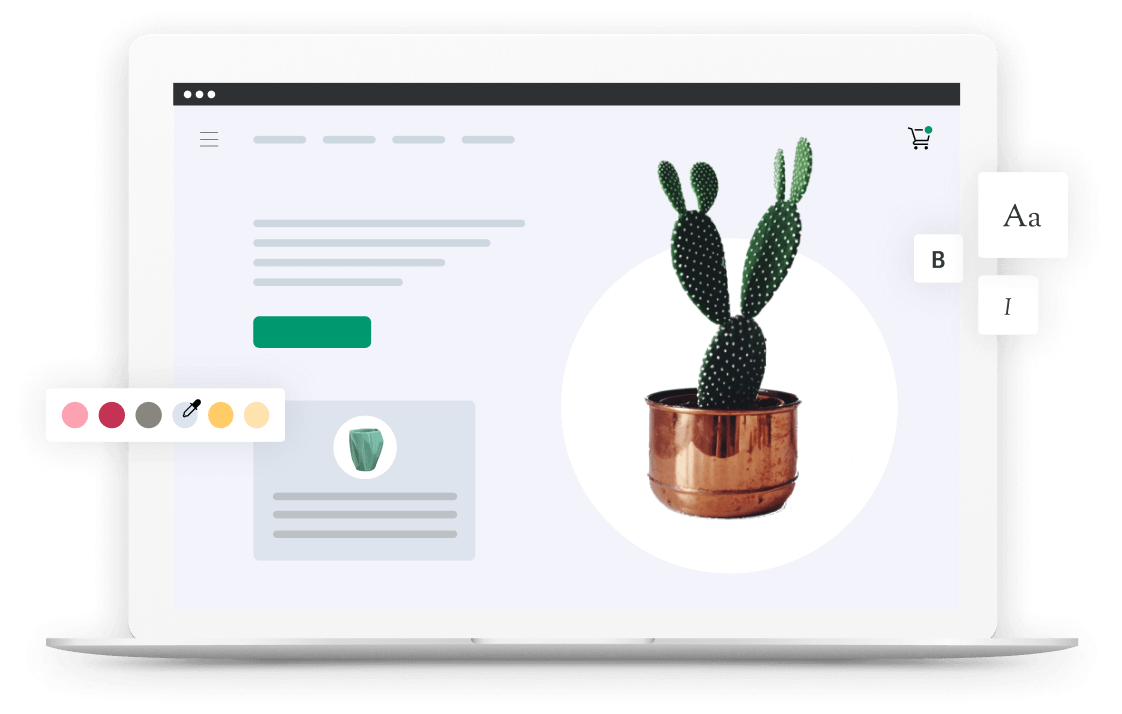Shopify vs GoDaddy
Shopify vs GoDaddy 2024 - Which is Better for Your Ecommerce Business?
Shopify is an easy to use drag-and-drop store builder with over 6.000 apps, built-in fraud analysis, and over 100 payment gateways.
Try Shopify free for 3 days, no credit card required. By entering your email, you agree to receive marketing emails from Shopify.

Shopify vs GoDaddy
| Key features | ||
|---|---|---|
| All themes are mobile responsive | GoDaddy | Shopify |
| App store | GoDaddy | Shopify with over 6.000 apps |
| Sales reporting | GoDaddy | Shopify |
| International payment methods | GoDaddy | Shopify |
| Blog CMS capabilities | GoDaddy | Shopify |
| Drag-and-drop store builder | GoDaddy | Shopify |
| Fraud analysis | GoDaddy | Shopify |
| Transaction fees | GoDaddy 0% | Shopify 0% with Shopify Payments |
| Custom online store | GoDaddy | Shopify |
| Reliable hosting | GoDaddy | Shopify |
| Custom domain name | GoDaddy | Shopify |
| Multimedia support on product pages | GoDaddy Image and video only | Shopify Image, GIF, video, 3d models, augmented reality |
| Point-of-sale solution | GoDaddy | Shopify |
| Business loans | GoDaddy | Shopify |
| Send email campaigns | GoDaddy | Shopify with Shopify Email |
| Secure payment gateways | GoDaddy over 40 | Shopify over 100 |
| Fully-featured mobile app | GoDaddy | Shopify |
| Product limits | GoDaddy 5000 | Shopify Unlimited |
| Storage limit | GoDaddy Depends on your plan | Shopify Unlimited |
| International customer support | GoDaddy | Shopify |
| Pricing | GoDaddy $29.99 USD for Ecommerce plan | Shopify Rp 25,00 USD for Basic plan when billed yearly |
Start selling with Shopify today
Try Shopify for free, and explore all the tools and services you need to start, run, and grow your business.

8 Things Shopify Can Do vs GoDaddy
Drag-and-drop store editing
A good store editor ensures that all your product information is displayed correctly. Both Shopify and GoDaddy offer drag-and-drop editors, but Shopify’s intuitive storefront editor makes it easier to design a great shopping experience compared to GoDaddy, which focuses more on domain registration and web hosting than ecommerce.
Access to trending sales channels
GoDaddy allows you to publish your products on the most common ecommerce channels like Facebook, Amazon, and eBay. Shopify, on the other hand, enables you to promote your products on these channels as well as other popular social media platforms and marketplaces, like TikTok, Google, Pinterest, and more.
Built for scale
While both Shopify and GoDaddy simplify the process of starting an eCommerce store, Shopify enables brands to grow without restrictions on their product catalog, whereas GoDaddy caps growth at 5,000 products. Shopify also has the experience and infrastructure to power stores that see massive volumes of traffic and sales.
Customization via over 6.000 Shopify apps
Shopify’s app store boasts over 6.000 apps (and counting!) which represent countless customization possibilities. What’s more is over 3,000 Shopify apps are free, so you don’t have to worry about hidden costs when launching your bootstrapped business. In contrast, GoDaddy lacks an integrated app store, which forces you to rely on the platform’s existing feature set.
Fully integrated POS
GoDaddy allows you to integrate with Square POS, but Shopify offers a first-party POS that fully unifies in-store and online sales. Using Shopify for both your website and POS, you can keep inventory fully synced, offer flexible shopping options like local pickup or ship-to-home, and provide seamless experiences for customers in-store and online.
Cutting-edge performance
Shopify is committed to delivering a lightning-fast store experience and can be integrated with new web development architectures like Jamstack, enabling users to integrate Shopify with static site generators like Gatsby to achieve faster speeds. GoDaddy, on the contrary, is constrained by its own platform and can only be optimized to a certain point, having a built-in cap in terms of performance.
Native payment options
Compared to Shopify, GoDaddy’s payment options are few and far between. Shopify Payments and Shop Pay are Shopify’s proprietary payment gateways. It offers 0% transaction fees and is available in 17 countries worldwide, enabling store owners to accept all major payments without integrations and modifications, making checkout easier.
Innovation-ready
GoDaddy and Shopify are two giants in the website building and eCommerce space, but the GoDaddy website builder was not intended to help brands innovate and keep up with new trends. Shopify has been able to adapt to the changing needs of ecommerce stores worldwide, launching new features for merchants including support for GIFs, 3D models, augmented reality experiences, and headless commerce functionality.
Why Merchants Prefer Shopify to GoDaddy
Sell high-ticket digital products
The GoDaddy website builder allows for the sale of digital products, but only up to 1GB in size with its most expensive premium plan. Shopify, on the other hand, allows retailers to sell much larger digital products through Shopify apps. This enables the sale of almost any form of digital product including extensive online courses, software, video series, white papers, graphic design, photography, and more.
Omnichannel & headless commerce
GoDaddy enables you to deliver content to web and mobile devices, but it fails to connect the range of devices and touchpoints consumers love to use when shopping online. Omnichannel shopping experiences enable customers to switch devices during their buying journey without interruption. Shopify leverages customer data to offer a smooth shopping experience across all major devices and touchpoints. Shopify POS connects offline and online sales, while Shopify’s headless commerce technology enables your brand to sell on any channel, including smart speakers, mall kiosks, and digital signage.
No platform lock-in
GoDaddy users are unable to export products directly from their stores, so if you decide to switch ecommerce platforms (or use an additional platform) in the future, you’ll need to start from scratch. With Shopify, you can easily export and import products via CSV file, ensuring that your brand’s growth is never at risk.
A community of millions
With Shopify store owners dotted around the globe, you’ll always have an experienced community to lean on, learn from, and converse with. From information about partners to details about integrations and coding, the Shopify community is the place to ask questions and get guidance to succeed on Shopify.
Enterprise-grade security for everyone
While GoDaddy encourages its retailers to implement the best practices for security, Shopify was built from the ground up to protect both merchants and consumers from harmful activities. For instance, Shopify’s fraud analysis feature helps identify fraudulent orders, prevent chargebacks, and even enables merchants to use third-party fraud detection software.
No code and custom code tooling
GoDaddy and Shopify are both easy to use for non-technical users, but Shopify was made with the needs of modern merchants and ecommerce store owners in mind. Shopify’s NoCode tooling makes it extremely easy to build and launch a store. Shopify also caters to technical users and gives developers the freedom to edit HTML and CSS for greater control.
Unparalleled flexibility
Build your ecommerce store and bring your toolbox with you. Shopify enables you to connect your existing tools or bring new ones to help merchants deliver high-converting shopping experiences. On the other hand, GoDaddy lacks the extensibility Shopify has and doesn’t enable the same level of interoperability.
Save time managing your business
Running an ecommerce business can be time-consuming without the right order management platform in place. Shopify’s out-of-the-box feature set makes it easy to manage new orders, edit existing ones, and spend less time on shipping and fulfillment. What’s more, many Shopify apps help automate your store even further, saving you even more time that you can spend on growing your business.
We’ve been able to build something in 3 years that a lot of brands haven’t actually gotten to in 10 years.
- Cee Cee’s Closet NYC
- Chioma
Learn More About Shopify

Compare Shopify
See how Shopify compares to other platforms

Shopify Community
Learn from business owners on the Shopify forums

Shopify Help Center
Find answers to all your Shopify questions fast
Start selling with Shopify today
Try Shopify for free, and explore all the tools and services you need to start, run, and grow your business.
FAQs
Which is better: Shopify or GoDaddy?
GoDaddy is a solid platform with plenty of benefits, but it can’t match Shopify’s ecommerce capabilities. Shopify’s integrability, simplified POS solutions, and ability to scale make it the best option for merchants with ambitions to grow.
Are Shopify and GoDaddy the same?
While you can use both Shopify and GoDaddy to purchase domain names and set up online stores, Shopify differs from GoDaddy with features that protect against fraud, support global growth, and enable omni-channel selling. GoDaddy offers a good feature set for first-time online merchants, but its ecommerce offering is not compatible with long-term or international growth. With no app marketplace to add functionality and differentiate your online store, along with a 5,000 product limit, GoDaddy isn’t ideal for ambitious ecommerce businesses that wish to scale globally.
Can I use a GoDaddy domain on Shopify?
Yes, you can connect any domain purchased from any domain registrar with Shopify. You can also purchase domains directly through Shopify to make your ecommerce website launch even smoother.
Is Shopify more expensive than GoDaddy?
Shopify and GoDaddy both cost roughly the same, with ecommerce plans starting at Rp 228,00 USD when billed yearly. However, GoDaddy’s commerce capabilities are capped here and don’t offer you any more pricing plans for additional features. Shopify Basic can be upgraded even further so you can scale your store as much as needed. Already using GoDaddy? Begin migrating to Shopify quickly and easily.
Page last updated: May 6, 2021
What’s the best commerce platform for you?
Learn why thousands of businesses migrate to Shopify every year.